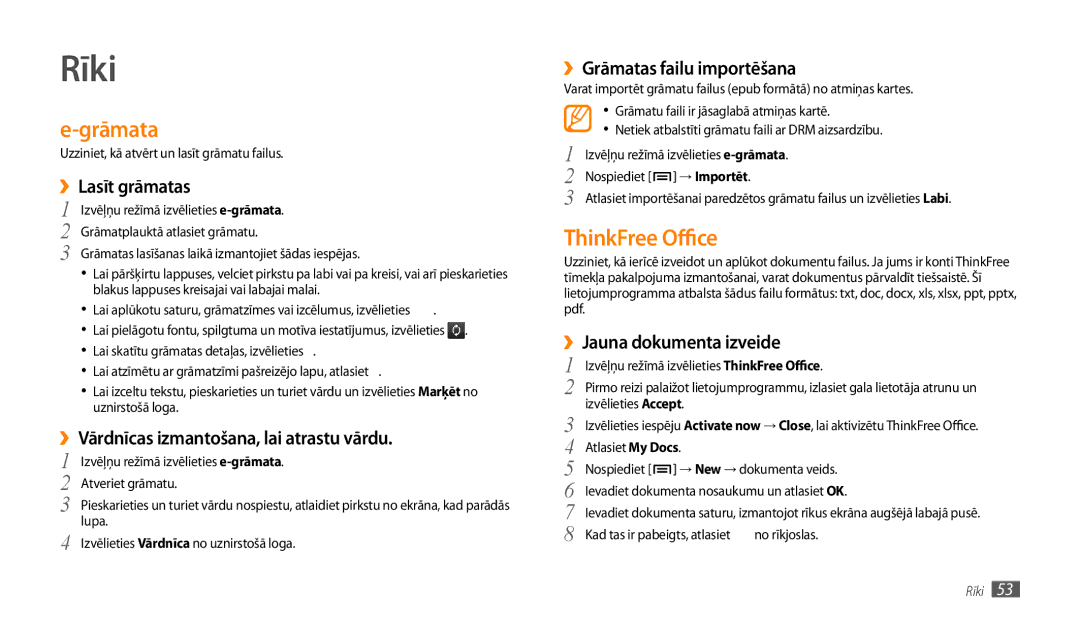Lietotāja rokasgrāmata
Vispirms izlasiet šo
Rokasgrāmatas lietošana
Lūdzu, glabājiet šo pamācību turpmākai lietošanai
Rokasgrāmatas lietošana
Autortiesības
Norādījumu ikonas
Prečzīmes
Izslēgšanas taustiņam
PAR Divx Video
Saturs
Saturs
Saziņa
Iestatījumi
Komplektācija
Salikšana
Akumulatora uzlāde
Salikšana
Atmiņas kartes ievietošana papildiespēja
SIM vai Usim kartes ievietošana
Izņemiet SD karti
››Atmiņas kartes izņemšana
››Atmiņas kartes formatēšana
Ierīces ieslēgšana un izslēgšana
Darba sākšana
››Pārslēgt lidojuma režīmā
››Pārslēgt klusuma režīmā
››Indikatora ikonas
››Taustiņi
Darba sākšana
››Skārienekrāna pagriešana
Skārienekrāna lietošana
››Skārienekrāna bloķēšana vai atbloķēšana
Pareizs laiks
››Vienumu pievienošana sākumekrānam
Iepazīšanās ar sākumekrānu
››Vienumu pārvietošana uz sākumekrānu
Piekļuve lietojumprogrammām
››Īsceļu paneļa izmantošana
››Lietojumprogrammu kārtošana
Ierīces pielāgošana
››SIM vai Usim kartes bloķēšana
››Iestatiet ekrāna bloķēšanu
››Teksta ievades metodes maiņa
Teksta ievade
››Teksta ievade ar Swype tastatūru
Tekstu var ievadīt, atlasot rakstzīmes virtuālajā tastatūrā
Ievadiet bieži izmantotos simbolus
››Teksta ievade ar Samsung tastatūru
››Teksta kopēšana un ielīmēšana
Pārlūks
Tīmeklis
››Tīmekļa lapu pārlūkošana
Atvērt numura sastādīšanas ekrānu
››Grāmatzīmju veidošana izlases tīmekļa lapām
››Informācijas meklēšana ar balsi
››Vairāku lapu atvēršana
››RSS plūsmas adreses pievienošana
Readers Hub
Samsung Apps
News and Weather
Market
››Skatīt informāciju par laikapstākļiem
››Lejupielādējiet un instalējiet lietojumprogrammu
YouTube
››Lietojumprogrammas atinstalēšana
››Videoklipu skatīšanās
Maps
Ikdienas apskats
Places
28 Tīmeklis
Navigācija
Google Search
Google Mail
Saziņa
››E-pasta ziņu sūtīšana
››E-pasta ziņas skatīšana
››E-pasta konta iestatīšana
Pasts
Ziņas
Talk
››Īsziņas vai multiziņas skatīšana
Zvanīšana
››Balss pasta ziņu noklausīšanās
››Zvanīšana un atbildēšana uz zvanu
Zvanīšana
››Izmantojiet balss zvana laikā pieejamās opcijas
››Neatbildēto zvanu apskatīšana un atzvanīšana
››Iespēju izmantošana video zvana laikā
››Papildfunkciju lietošana
Atlasiet Automātiskais noraidīto saraksts
Pārsūtīšana
››Zvanu arhīvu apskatīšana
Zvans → Video zvana pārsūtīšana
Atlasiet nosacījumu
Mūzika
Izklaide
››Mūzikas failu pievienošana ierīcei
››Mūzikas atskaņošana
Kamera
Music Hub
››Atskaņošanas saraksta izveide
››Mūzikas atskaņotāja iestatījumu pielāgošana
Kameras statusa un iestatījumu pārbaudīšana Izšķirtspēja
››Fotografēšana
››Panorāmas fotoattēla uzņemšana
››Fotoattēlu sērijas uzņemšana
››Fotoattēlu uzņemšana smaidoša foto režīmā
→ Nepārtraukts
››Videoklipa ierakstīšana
››Fotoattēlu uzņemšana pašportreta foto režīmā
››Pielāgot kameras iestatījumus
Iespējām Iespēja Funkcija Baltā balanss
››Videokameras iestatījumu pielāgošana
Pārbaudiet videkameras statusu un iestatījumus Izšķirtspēja
Nodzēst Atjaunot videokameras iestatījumus
Video
Skaņas signālu
››Videoklipa atskaņošana
Galerija
››Fotoattēla skatīšana
Kontakti
Personiskā informācija
››Kontakta izveide
››Kontakta atrašana
››Kontaktu grupas izveide
Kalendārs
››Kopēt vai pārvietot kontaktus
››Kontaktu importēšana vai eksportēšana
Piezīme
Savienojumi ar datoru
Savienojamība
››Savienojums ar Samsung Kies
››Sinhronizēšana ar programmu Windows Media Player
››WLAN funkcijas aktivizēšana
Wi-Fi
››WLAN atrašana un savienojuma izveide
››Manuāla Wlan pievienošana
USB tīkla pieslēgums
Mobile AP
››Mobilā AP funkcijas aktivizēšana
Lai aktivizētu Mobile AP funkciju, atlasiet Mobile AP
››Bezvadu Bluetooth funkcijas ieslēgšana
Bluetooth
››Bluetooth ierīču meklēšana un savienošana pārī
››Datu sūtīšana, izmantojot Bluetooth bezvadu funkciju
››Failu atskaņošana citā ierīcē ar Dlna funkciju
AllShare
››Aktivizēt atrašanās vietas pakalpojumus
Savienojumi ar TV TV izejas režīms
ThinkFree Office
Rīki
Grāmata
››Dokumenta apskatīšana un rediģēšana ierīcē
Mani faili
››Dokumentu pārvaldīšana tiešsaistē
››Atbalstītie failu formāti
Modinātājs
Fotorāmis
Pasaules pulkstenis
Uzdevumu pārvaldnieks
››Modinātāja signāla pārtraukšana
››Modinātāja signāla dzēšana
Voice Search
Bezvadu funkcija un tīkls
Iestatījumi
Piekļuve iestatījumu izvēlnei
Zvana iestatījumi
Displeja iestatījumi
Skaņas iestatījumi
Atrašanās vieta un drošība
Mainiet displeja iestatījumus
Konti un sinhronizācija
Programmas
Iestatīt SIM kartes bloķēšanu
Izstrāde
SD karte un tālruņa krātuve
Konfidencialitāte
Meklēt
Valoda un teksts
››Samsung tastatūra
Balss ievade un izvade
››Balss atpazīšanas iestatījumi
››Teksta pārveide runā iestatījumi
Par tālruni
Pieejamība
Datums un laiks
Problēmu novēršana
Problēmu novēršana
Izvēlni Bloķēt SIM karti
Pārbaudiet, vai netiek bloķēta ierīces iekšējā antena
Izejošie zvani nesavienojas
Atverot mūzikas failus, tiek parādīti kļūmes paziņojumi
Sargājiet ierīci, akumulatorus un lādētājus no bojājumiem
Drošības pasākumi
Izslēdziet ierīci, ja tā norādīts
Neizmantojiet ierīci citu elektronisku ierīču tuvumā
Izslēdziet ierīci, atrodoties lidaparātā
Neizmantojiet ierīci elektrokardiostimulatora tuvumā
Izslēdziet ierīci sprādzienbīstamā vidē
Neglabājiet ierīci uz nelīdzenas virsmas
Neļaujiet ierīcei samirkt
Neglabājiet ierīci magnētisko lauku tuvumā
Nenometiet ierīci un nepakļaujiet to citu veidu triecieniem
Dzirdes saudzēšana
Runājot pa ierīci
Esiet uzmanīgi, izmantojot ierīci pārvietojoties
Nenēsājiet ierīci aizmugures kabatā vai ap vidukli
72 Drošības pasākumi
Izstrādājuma pareiza likvidēšana
Drošības pasākumi
Atbalstītie failu formāti
Alfabētiskais rādītājs
Sērijas uzņemšana 39 skatīšana 43 uzņemšana
Indikatora ikonas
Importēšana vai eksportēšana 45 izveide
Konti un sinhronizēšana
Iespēju izmantošana 34 veikšana
ThinkFree Office Tīmekļa pārlūks
EN 50332-1
Saskaņā ar mūsu atbildību atzīstam, ka šis produkts
EN 50332-2
EN 62311
Kies sinhr. ar datoru instalēšana

